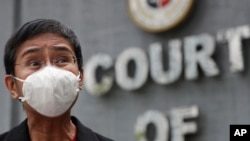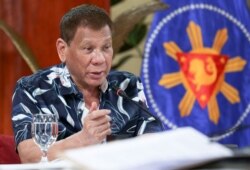An analysis of five years of internet trolling directed at Maria Ressa found a concerted effort to undermine credibility and trust in the Philippines-based journalist.
The study by the International Center for Journalists (ICFJ) examined over 400,000 tweets over a 13-month period and 57,000 public Facebook posts and comments published between 2016 and 2021.
While 60% of the attacks were aimed at Ressa’s professionalism, over 40% were personal assaults, with the researchers saying many could be defined as misogynistic, sexist or explicit abuse. The findings reflect the wider problem of online harassment and attacks directed at female journalists.
“We wanted to provide concrete data and academically rigorous analysis to verify the lived experiences of online violence reported by women journalists,” Julie Posetti, global director of research at the ICFJ and co-author of the report, told VOA.
Ressa, who founded the news website Rappler in the Philippines in 2012, is fighting multiple legal cases that are widely viewed as retaliation for her outlet’s investigations and criticisms of Philippine President Rodrigo Duterte.
Alongside the court cases, Ressa is dealing with a barrage of online attacks aimed at discrediting and harassing her work. Often, the assaults come in response to Rappler’s investigative journalism.
Ressa received an average of 90 hate messages an hour in 2016 when Rappler published its “Propaganda War” series, which investigated paid trolls and their impact on online information.
Her news outlet also had to increase security after attackers posted Rappler’s address online, leading to people turning up at the office.
When the ICFJ worked with Rappler journalists and computer scientists at the University of Sheffield in the U.K. to analyze the online attacks, they found the posts created “an enabling environment for the state-led legal harassment of Ressa.”
Some attacks also appeared to be coordinated which, the report said, is a “hallmark of state-led disinformation campaigns.” Those posts were linked to pro-Duterte accounts that retweeted anti-Ressa comments or shared false information about the journalist.
“The fact that we were able to demonstrate clear links between the coordinated state-linked attacks on Maria online and her persecution and prosecution offline … was very important. It’s also the first time that we have seen a detailed anatomy of these sort of attacks, across multiple platforms, at scale,” said Posetti.
The analysis of Facebook posts also found a link to operations in China set up to promote support for Duterte. The apparent link was first reported by network analysis firm Graphika in September 2020.
Facebook announced it had removed a cluster of fake assets on Facebook and Instagram on September 22 that it attributed to individuals in China. The accounts attacked critics including Ressa and opposition senators.
The Philippines Department of Information and Technology did not respond to VOA’s email requesting comment.
The public diplomacy department of the Philippines Embassy in Washington described the court cases against Ressa as “a legal dispute between two private parties,” and said the journalist will be “accorded due process.”
The embassy email to VOA added that the Philippines holds press freedom in “high regard” and added, “Like the United States and the rest of the world, we are having national conversations on how we can use social media in an empowering and responsible way.”
Global problems
The analysis reflects the wider problem that journalists, especially women, face globally from social media.
The attacks on Ressa “are emblematic of the online violence so many women journalists are subjected to every day,” Nadine Hoffman, deputy director of the International Women’s Media Foundation (IWMF), said in a statement emailed to VOA. “As ICFJ’s new research shows, these attacks are personal, targeted attempts to discredit and silence women’s voices online.”
A UNESCO-ICFJ survey of journalists who identify as women published in December found that 73% had experienced online violence. A further 18% said they faced threats of sexual violence.
Reporting on gender, politics and elections, and human rights and social policy led to the greatest risk of attack, the survey found.
Researchers and media rights groups have suggested solutions to minimize and handle online threats against female journalists, and offer resources such as the Coalition Against Online Violence, which offers support and guides to digital safety.
Twitter and Facebook have both said they will address the attacks against Ressa. The ICFJ has also recommended that governments and social media platforms do more to stop online harassment.
“This might be what it takes to get intergovernmental organizations, state actors, law enforcement and the judiciary, news organizations and the platforms to take more effective action to address this freedom of expression and gender equality crisis,” Posetti said.





